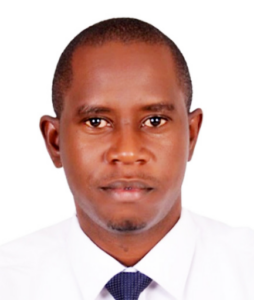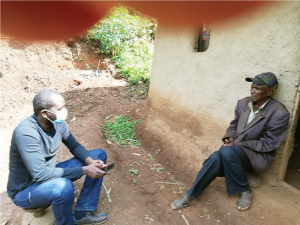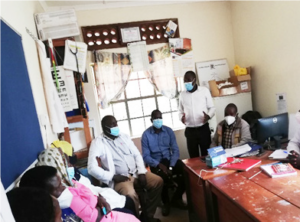 |
Phoebe Nabunya
|
||
ABOUT THE FELLOWBob Omoda Amodan holds a Master of Public Health Degree from Makerere University, School of Public Health. Before joining the fellowship program, he pursued another Masters in Sanitation from the Netherlands. Bob has worked with both government and nongovernmental establishments for over 10 years. He has implemented and managed several public health interventions ranging from surveillance, improving institutional and household WASH services, immunization, Nutrition, HIV, neglected tropical diseases, and malaria in Busia, Teso, Karamoja and West Nile sub-regions in Uganda. The practical aspects critically linking the above-mentioned public health programs with epidemiology/ surveillance, and scientific communication were clear gaps exhibited during his career before he joined this fellowship program. The fellowship has made Bob gain advanced outbreak detection and investigation skills, multitasking abilities, policy briefs and funding proposal development, scientific writing, presentation and publication skills, rapid management/leadership and technical capacity building abilities, operational and strategic planning, clear and timely documentation, healthcare systems strengthening, coordination and advocacy skills. Additionally, Bob is proud of the strong research methods, large database management and analysis (Epi info, STATA, SPSS), and GIS mapping skills, among others. Whereas Bob has written and published a number of manuscripts, bulletin, and newspaper articles, he is also a scientific reviewer in PLoS ONE, BMC Public health and Journal of Public health in Africa. In addition, Bob is a very interesting presenter, who has made presentations in both national and international conferences, including NFEC, PEPFAR summit, E. African FETP conference, FETP international Nights, IANPHI webinar and ICEID. Notably, he got a best presenter award in the East African FETP conferences on COVID-19 in November 2020. Bob’s supervisors and peers recognize that he is a hardworking, jolly, outgoing, respectful, and above-all, honest person. He speaks his mind easily, and has very strong team-work and negotiation skills. Following his accomplishments in the fellowship program, Bob has no doubt that he will excel as a Public health specialist and Epidemiologist for enhanced global health security. Achievements at the Host SiteThe Uganda National Expanded Program on Immunization (UNEPI) is a national program that mainly targets infants and women of childbearing age. Immunization is among the most successful and cost-effective public health interventions in preventing a child from dying before celebrating his or her first birthday. It is a priority intervention within Uganda’s minimum health care package, which directly contributes to the Ministry of Health vision and goal. The program offers the following services:
Fellowship program specific achievements
The fellow led and participated in several outbreak investigations. First, a measles outbreak was reported in Nakivale refugee settlement, Isingiro district in March 2020. He was asked to co-lead the investigation, which later discovered that the outbreak was due to overcrowding at the reception centre of the refugee settlement.In May 2020, the fellow was involved in the investigation of the first community transmission case of COVID-19 in Masindi district. During this outbreak investigation the findings concluded that the index case could have got the infection from the track drivers since he was always involved police night patrol on the highway. The recommendations for this investigation were presented to the IMT for COVID-19. Indeed, the fellow went ahead to build capacity and manage contact tracing and establishment of a community-based surveillance system using Health Assistants. His experiences in this task are well documented in one of his manuscripts and EPI bulletins. This investigation resulted into written products such as:
Makerere University Kampala requested the UPHFP to nominate two fellows to support and coordinate an International Citizen Project (ICP) to assess adherence to preventive measures and their impact on the COVID-19 outbreak in low- and middle-income countries. Bob was asked to lead the project. During this task, he successfully implemented the project, and resulted into the following written products:
As part of the national response team, the fellow has also been involved in many other disease/ event responses, including:
The fellow conducted an EPI study entitled: “Factors associated with mental and psychosocial wellbeing of healthcare workers in refugee settings during COVID-19 pandemic in Uganda, 2020” from 3 to 17 September 2020. Background: Uganda hosts over 1.4 million refugees, with over 90% of them coming from South Sudan and Demographic Republic of Congo. Twelve (12) districts of Uganda host refugees. COVID-19 was reported in many refugee settlements. Uganda’s refugee settlements, which hosts 18 quarantine centers were also integrated into local communities. Several of the preventive strategies currently proposed by the WHO such as isolation and social distancing were not feasible or difficult to implement in refugee settlements because of overcrowding and other associated factors. HCWs working in refugee settlements are at high risk of acquiring COVID-19 infection. Moreover, they can transmit the infection while still asymptomatic to patients who are at high risk of severe COVID-19 disease because of underlying diseases or because of old age. It was therefore critical to assess the mental and psychosocial wellbeing of HCWs in order to identify their needs, and provide supportive interventions to reduce the impact of COVID-19 on their psychosocial state. Methods: The fellow conducted a cross sectional study among Doctors, Clinical Officers, Nurses, Laboratory staff, Health Inspectors, Health Assistants, Public Health Officers, Dentists, Health educators, Radiographers, Counsellors, Records Assistants, Theatre staff, Stores staff and Cleaners in 35 health care facilities from 7 refugee settlements across the country. The primary outcome measure was the mental and psychosocial wellbeing of HCWs during the COVID-19 pandemic, which was assessed using the Hospital Anxiety and Depression Scale for the diagnosis of anxiety and depression. Results: In total, 346 healthcare workers participated in the assessment, with mean age of 30.5±6.4. Almost half (n=165, 48%) of the respondents were in the age group of 25-29 years, and 144 (42%) were catholics. Among 346 respondents, 174 (50.3%) were female, 188 (54%) were lining with partners, and 105 (30%) were nurses or midwives. In this study the fellow found that A quarter (22%) of the respondents had anxiety, and half (49%) had depression. Overall, over half (55%) of the respndents had either anxiety or depression or both, indicating poor mental and psychosocial wellbeing. There was a significant difference in mental and psychosocial wellbeing in all the 7 refugee settlements (X2=14.18, p=0.03). During multivariate analysis, living far away from HCF (aOR: 2.56, 95% CI: 1.17–5.59), experienced flu in the past two weeks (aOR: 2.42, 95% CI: 1.21–4.82), and giving triage services at health facility (aOR: 2.19, 95% CI: 1.19–4.00) increased odds of having anxiety among healthcare workers. Having workmates who always respected basic rules of handwashing (aOR: 0.08, 95% CI: 0.01–0.47) decreased odds of having anxiety among healthcare workers. During multivariate analysis, not living with partner (aOR: 0.62, 95% CI: 0.39–0.99), and giving clerking services at the health facility (aOR: 0.53, 95% CI: 0.32–0.86) decreased odds of having depression among healthcare workers.During modelling, the crude and adjusted odds ratios of depression among those giving clerking services at the health facility increased by over 10%, indicating that its effects on the outcome was distorted by confounding variables, including having had a running nose. The final model controlled for confounding, and later assessed for interaction on multiplicative scale.The effect of interaction among the statistically significant variables was tested using the sex as the main predictor variable for depression. The tests for interaction indicated there was no statistically significant effect (p>0.05) on depression. Conclusion: The study recommeded that there was need for healthcare workers to have job rotational shifts, get accomodation within health facilities, and adopt staying with partners and family memebers to improve on their mental health status. He further recommended that trainings and on job monitoring of IPC should be scaled up, inaddition to having dedicated counselling service provision at the health facility. The mental and psychosocial wellbeing of healthcare workers study among refugees resulted in the following products:
Summary of Epidemiological Study: Title: Spatial distribution of cases in Bugweri district, during a malaria outbreak June 2020 Background: Methods: Results: Conclusion: Key lessons learnt during the fellowship
|
|||
|
|
|
|


